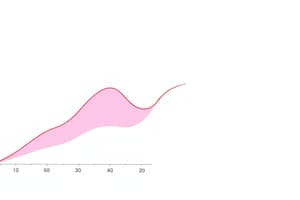Podcast
Questions and Answers
What is randomness?
What is randomness?
A phenomenon is random if any individual outcome is unpredictable, but the distribution of outcomes over many repetitions is known.
Define probability models.
Define probability models.
Probability models are mathematical constructs that represent random phenomena by specifying the outcomes and their associated probabilities.
What does it mean if an event is random?
What does it mean if an event is random?
It means that any individual outcome cannot be predicted with certainty.
What is the probability of an outcome?
What is the probability of an outcome?
Signup and view all the answers
What is a sample space?
What is a sample space?
Signup and view all the answers
In a coin toss followed by a die roll, what is the sample space?
In a coin toss followed by a die roll, what is the sample space?
Signup and view all the answers
When recording the number of people who walk into a post office, what is the sample space?
When recording the number of people who walk into a post office, what is the sample space?
Signup and view all the answers
What is an event in probability?
What is an event in probability?
Signup and view all the answers
What does it mean for two events to be independent?
What does it mean for two events to be independent?
Signup and view all the answers
What is the Addition Rule in probability?
What is the Addition Rule in probability?
Signup and view all the answers
What is the probability of having neither surgery nor obstetric treatment if the probability of having surgery is 12% and obstetric treatment is 16% with both probabilities being 2%?
What is the probability of having neither surgery nor obstetric treatment if the probability of having surgery is 12% and obstetric treatment is 16% with both probabilities being 2%?
Signup and view all the answers
What is the probability that the sum of a die roll will be 8 when rolling two dice?
What is the probability that the sum of a die roll will be 8 when rolling two dice?
Signup and view all the answers
Explain Gambler's fallacy.
Explain Gambler's fallacy.
Signup and view all the answers
What is Benford's Law?
What is Benford's Law?
Signup and view all the answers
What is the expected value (mean) of a random variable denoted as?
What is the expected value (mean) of a random variable denoted as?
Signup and view all the answers
What is the variance of a random variable denoted as?
What is the variance of a random variable denoted as?
Signup and view all the answers
What is the expected difference in cost between cats and dogs if a cat costs $130 and a dog costs $100?
What is the expected difference in cost between cats and dogs if a cat costs $130 and a dog costs $100?
Signup and view all the answers
Study Notes
Randomness and Probability
- Randomness: An outcome is random if individual results are unpredictable, but the overall distribution is known (e.g., tossing a coin produces unpredictable flips, but results in roughly half heads and half tails over time).
- Probability: Defined as the proportion of times an outcome occurs over many trials; people often misjudge when outcomes will stabilize into a pattern.
Sample Space and Events
- Sample Space (S): All possible outcomes of an experiment (e.g., tossing a coin thrice yields S = {HHH, HHT, HTH, HTT, THH, THT, TTH, TTT}).
- Events: Subsets of outcomes from the sample space denoted as A, B, C, etc. An event can be independent (one does not affect the other) or through overlaps (A and B).
Probability Concepts
- Addition Rule: For two events, P(A or B) = P(A) + P(B) - P(A and B), to adjust for overlap.
- Independence: Two events A and B are independent if P(A and B) = P(A) * P(B). This criterion doesn't coincide with the concept of disjoint events.
Important Probability Calculations
- Expected Value (E): Mean of a random variable, calculated as E(X) = Σ[P(X) * X]. It represents the average outcome.
- Variance (V): Measures the spread of a random variable around the expected value, denoted as V(X).
Common Probability Scenarios
- Experiments: Examples include rolling dice, drawing cards—outcomes are assessed to find probabilities.
- Gambler’s Fallacy: The misconception that past random events influence future outcomes; no event is "due" to happen.
- Prosecutor’s Fallacy: Error in assuming a low probability of an outcome (like DNA evidence) solely proves guilt without considering base rates in the population.
Rules of Thumb in Probability
- "And" translates to multiplication (for independent events).
- "Or" translates to addition (for disjoint events).
- For difficult probabilities, consider calculating the complement of the event.
Special Cases of Probability
- Benford's Law: Observes the frequency distribution of first digits in data, often used in fraud detection. First digits often skew towards lower numbers.
- Law of Large Numbers: States repeated trials will yield an observed frequency closer to the expected frequency.
Random Variables
- Definition: A variable assigning numbers to outcomes, with distinct probability distributions.
- Properties: The mean and variance of independent random variables can be combined. Specific properties like E(cX) = cE(X) apply.
Example Calculations
- Calculating probabilities from various scenarios, finding expected outcomes using defined probabilities (e.g., John suing his landlord).
- Calculation examples illustrate the relationship between variety of outcomes—like Thomas's potential bonuses and their respective probabilities.
Cautionary Notes
- Random variables behave differently from algebraic variables; traditional algebraic rules may not apply when dealing with their variances and means.
Studying That Suits You
Use AI to generate personalized quizzes and flashcards to suit your learning preferences.
Description
Test your knowledge on key concepts from Statistics Chapter 4, focusing on probability and randomness. These flashcards cover essential terms and definitions that are foundational to understanding probability models. Ideal for students looking to reinforce their grasp of statistical principles.




